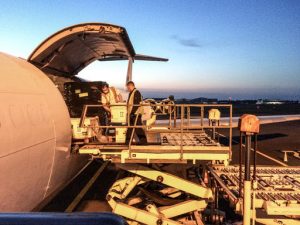On 25 March 2020, US Secretary of State Mike Pompeo tweeted that “The Iranian regime kicked out Doctors without Borders @MSF, which was setting up a field hospital for Iran’s most vulnerable #coronavirus patients. The regime’s longest-suffering victims are its own people”.
This tweet, which of course overlooked the US actions which also affect the vulnerable in Iran – demonstrated the reality of how quick states are to use the suffering of others – and MSF’s attempts to assist them – to score political points. And it was yet another example of the US government playing politics with this pandemic, from President Trump’s insistence to refer to COVID-19 as the “Chinese virus” to these exaggerated claims by the Secretary of State to undermine their Iranian enemy. While MSF did have to suspend its deployment of a COVID-19 treatment hospital and teams in Isfahan – activities that had been planned and agreed with Iranian authorities – the organisation was not ‘kicked out’ of Iran. This was recently confirmed by the Iranian Ministry of Health itself.
Pompeo has sought to use humanitarian action to undermine a US enemy before. In Venezuela in 2019, the US government promoted regime change and touted the option of military intervention hand-in-hand with the delivery of humanitarian aid to the Venezuelan border. When the Maduro government blocked the aid from entering the country, the head of USAID called on the Venezuelan army to turn on Maduro, while Pompeo tweeted: “The American people stand with the courageous people of #Venezuela. Humanitarian aid should be allowed to reach them. #EsamosUnidosVE”.
Pompeo was not the first, nor will he be the last, senior political figure to stage a proxy battle using humanitarian concerns. Humanitarian crises and the fate of the most vulnerable are often used to undermine enemies, or to promote allies. MSF has to continually navigate how our assistance is instrumentalised according to various political agendas. And we have always resisted against the incorporation of our action into agendas that come at the detriment to our ability to deliver medical humanitarian assistance.
MSF experienced a similar event in 2013 with the former US Secretary of State John Kerry. Since 2012 MSF had attempted to work on both sides of the conflict in Syria. However, we never received the authorisation of the Syrian government, and so were forced to work on only one side of the conflict through support to medical staff caring for patients in areas under the control of the opposition. In 2013, we communicated that a health facility supported by MSF in Eastern Ghouta had received patients with symptoms consistent with exposure to a neurotoxic agent. We didn’t point fingers at who might have been responsible – we simply didn’t know based on the medical facts. However, John Kerry seized on the statement and announced that MSF had confirmed a chemical attack carried out by what he referred to as the Syrian regime. MSF responded immediately with a counter statement reiterating the medical facts – and what couldn’t be concluded from the same – warning against the misuse of this information to justify a military intervention. But the damage had been done. To this day some people mistakenly consider MSF to have been supportive of a US military intervention in Syria.
Another form of manipulation is the direct use of humanitarian aid to achieve military objectives. For example, in Pakistan in 2011, the CIA allegedly carried out a fake vaccination campaign through an NGO in order to gather the DNA needed to verify the location of Osama Bin Laden ultimately resulting in his assassination. MSF denounced this as a grave and unacceptable manipulation of the medical act that would undermine trust in health workers in conflict areas around the world.
In Afghanistan, when the US invasion began, humanitarian aid was distributed as part of a hearts and minds campaign to win over support from the population for US forces on the ground. Under the Obama administration, the policy evolved from trying to win support for US troops to that of the US-backed Afghan government. Service delivery was viewed as a vital way to undermine support for the armed opposition. By funding humanitarian and development actors to work under the direction of the Afghanistan government, the US and other major donors ensured that their activities were aligned with their military efforts in the country. MSF attempted to distinguish itself from the state-building agenda by establishing independent medical activities while negotiating our access directly with all armed actors, from the Taliban to the US army and Afghan government.
Playing politics with humanitarian aid is not only limited to the United States. From Nigeria to Iraq to Yemen to Syria, we must navigate daily the way in which warring parties incorporate humanitarian action into their political calculations.
These experiences have taught us that trust in humanitarian action is hard to build, and can be quickly undermined. In the current context of a global pandemic, it should be clearer than ever that now is not the time to erode trust in humanitarian action. Our collective health relies on the ability of medics to work across all political divides. As the pandemic spreads to countries with already insufficient and overstretched health systems, the world will need more international solidarity, and much less petty political point-scoring.
Jonathan Whittall is director of the Analysis Department for Médecins Sans Frontières / Doctors Without Borders (MSF) operational centre in Brussels.
Photo by Brigitte Rossotti © MSF, 2020.
